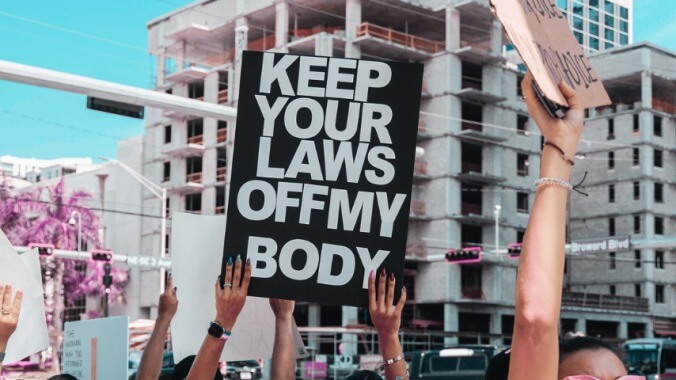South Carolina Moves Toward Passing the Most Extreme Abortion Ban in America
At a public hearing on Wednesday, one OB-GYN said that the proposed bill "constitutes an unconstitutional reach that threatens the very fabric of health care in our state."
Photo: Getty Images Politics
On Wednesday, South Carolina lawmakers held a hearing to consider Senate Bill 323—which, if passed, would mean the state would have the most extreme abortion ban in the country. The hearing, which hosted more than 300 people, was maddening, difficult to watch, and stuffed with religious zealots—and not just from the public. To kick things off, the Senate committee bowed their heads in solemn prayer. Vainly and plainly, Jesus Christ.
As of 2023, South Carolina bans the procedure at six weeks, meaning the state is already home to one of the strictest abortion bans in the country. But SB 323, which was introduced in February, would amend the “Unborn Child Protection Act” to completely ban abortion by eliminating exceptions for cases of rape, incest, and fetal defects, and criminalizing abortion as homicide. It also threatens anyone who terminates their pregnancy or anyone who helps someone get an abortion, which includes physicians and healthcare workers, with up to 30 years in prison. It would also affect access to birth control and IVF, and impact sex education in schools.
Wednesday’s hearing is only the first step before the bill is considered by the Senate and then the House. But the state has been trying to pass an abortion ban for a while now, making the move all the more alarming.
The legislation was introduced by GOP Senators Rex F. Rice, Billy Garrett, and Richard Cash—the latter of whom once compared the fight against abortion rights to the fight against abolishing slavery. He also said teenagers should not have access to birth control.
The hearing was held by a subcommittee of South Carolina’s Senate Medical Affairs Committee—and a gaggle of anti-abortion clergynuts spoke, most of whom used biblical jargon to get their point across. Speaking directly to the senators, one pastor said: “We are praying for you, that you would by the strength of God, do what’s right simply because it’s right.” Another called abortion “murder” and called on his fellow “delegated bearer[s] of justice” before demanding penance from the whole room. “Please repent, submit to Christ and establish justice for our pre-born neighbors.”
-

-

-

-

-

-

-

-

-

-

-

-

-

-

-

-

-

-

-

-

-

-

-

-

-

-

-

-

-

-

-

-

-

-

-

-

-

-

-

-








































